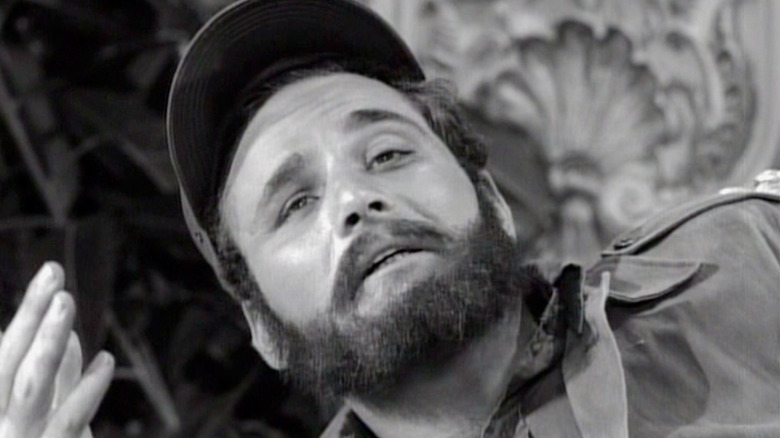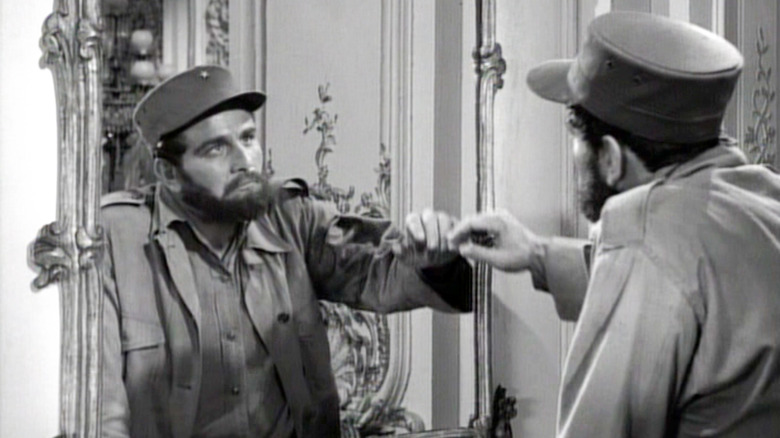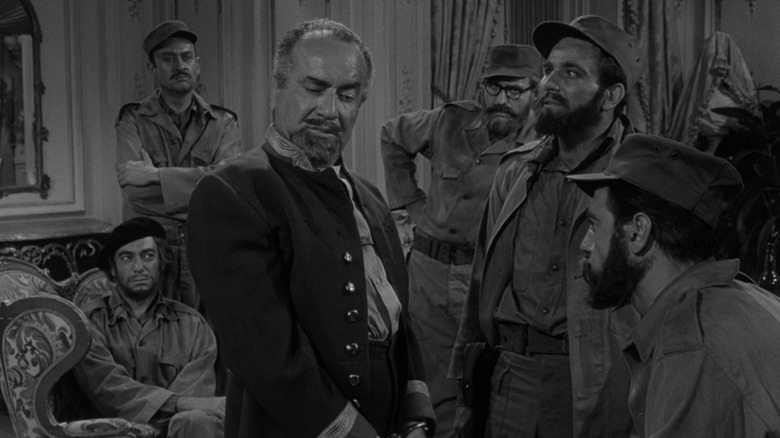Even Columbo's Peter Falk Couldn't Save The Twilight Zone's Take On Fidel Castro
"The Twilight Zone" is often lauded for its social commentary; it condemned things like racism and nationalism and beauty standards, even as the world around it failed to follow suit. It was a bold and innovative show, but it was also churning out up to 37 episodes a season, so a few clunkers were all but guaranteed. Such was the case with season 3's "The Mirror," an episode that is very much not ahead of its time. Instead, it's perfectly in line with mainstream political opinion in 1961, and it makes for a somewhat dull, grating viewing experience as a result.
"The Mirror" focuses on a revolutionary figure named Ramos Clemente, who has just overthrown the previous government of a unspecified Central American country and is looking forward to his glorious reign. Although the episode does not call this man Fidel Castro, he's clearly based on him. He's played by Peter Falk, the guy who would go on to play the iconic detective "Columbo" throughout most of the '70s, but Falk's talent couldn't save a messy, unsubtle, one-sided script.
The episode depicts this Castro-insert as a paranoid, sadistic and cartoonishly evil man. The previous leader he's overthrown, who in real life would be the brutal far-right dictator Fulgencio Batista, is portrayed in a comparatively sympathetic light. He tells Clemente how he's doomed to fall down the same path as him, and he gives Clemente a mirror that will show him the faces of his would-be assassins. Sure enough, Clemente immediately starts ordering mass executions, and then starts killing his own confidants out of paranoia. Finally Clemente shoots himself, and a priest remarks, "The last assassin... They never learn. They never seem to learn."
Why it's bad
The episode hasn't aged well for a lot of reasons, the chief one being that the real Fidel Castro lived a long, seemingly happy life. He died of age-related natural causes in 2016, with the government he's built still in place even sixty years after this "Twilight Zone" episode aired. It's also become increasingly clear that any paranoia he might've had about assassinations was fairly justified. The United States, which has a long history of interfering with Latin American governments, did indeed try to kill the guy on plenty of occasions. Yet "Mirror" depicts these assassination attempts as the feverish paranoid fantasies of Clemente; either that, or the direct results of an unhappy country being tortured by his tyrannical rule.
The other issue is that, as time goes on, it seems more and more like Castro was not quite the crazy evil dictator that American media presented him as. He still did plenty of terrible things worthy of condemnation, like his now-reversed criminalization of homosexuality in the '60s and his general inclination towards authoritarianism. On the other hand, he did raise the average quality of life in the country, initiated a successful literacy program, and implemented a healthcare system that's more efficient and humane than our own. Since Fidel took over, the country's infant mortality rate also fell from 37.3 to 4.3 per 1000 live births, lower than it is in America.
Considering Cuba accomplished all this while putting up with an economically suffocating 60+ year trade embargo from the United States, we're forced to admit that Fidel's revolution wasn't a total disaster. Despite the "Twilight Zone" episode's smug certainty that Fidel would crash and burn, his government has already outlived the majority of the episode's cast and crew.
A low point in an otherwise great season 3
Of course, the dark sides of Castro's reign are still important to keep in mind, but the main reason they're so focused on — while many far worse dictatorships get far less scrutiny — is because he was not an American ally. If Castro had done all the same things while adamantly supporting the interests of the United States, it's doubtful the U.S. would've so strongly denounced him as a dictator in the first place. So much of Castro's image in America is shaped by American nationalism, which is something you'd usually expect the smart writers of the original "Twilight Zone" to see through.
"This was our impression of Castro at that time," said Buck Houghton, the show's producer, in the "Twilight Zone" companion book. "He was a very flamboyant Latin, which Peter [Falk] isn't. It goes back to all those banana-boat republic strong-arm men ... I think we had a fairly simplistic view of Castro at that time."
It all ties into perhaps the episode's biggest sin, which is that it doesn't have anything particularly insightful to say about the divisive figure. Its depiction of Castro is as simplistic as you'd expect from any American TV show at the time. There's no attempt to subvert any expectations or challenge any of its viewers' perception on the world. The episode is simply there to reinforce everyone preconceptions about the figure, and to reinforce the idea that anyone trying to change the status quo is inherently doomed to be just as bad as what he replaces. "The Twilight Zone" gave us some of the most thoughtful, game-changing episodes in television history throughout its run; "The Mirror" was not one of them.


